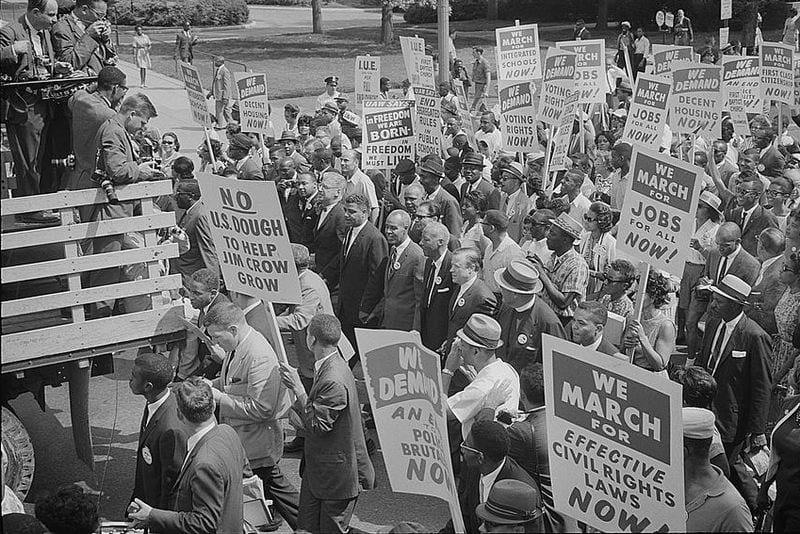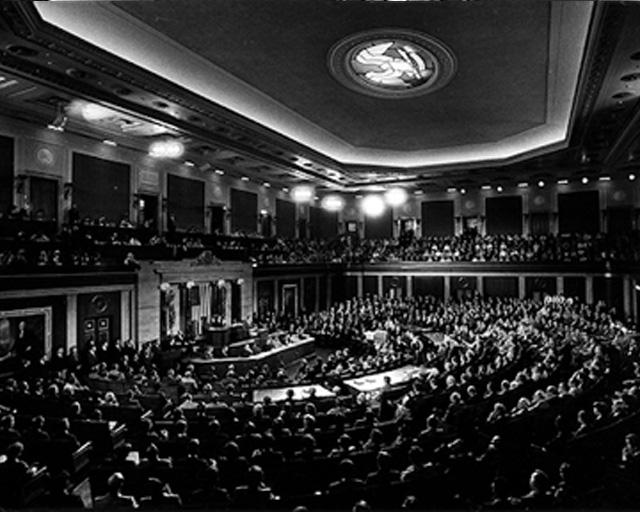
No related resources
Introduction
Richard Nixon (1913–1994), the thirty-seventh president of the United States, came into office in 1969 during the height of the Cold War. While the Constitution explicitly gives the power to declare war to Congress, this distinction had become blurred after World War II through continual armed conflicts abroad in both Korea (see A Foreign Policy for All Americans) and Vietnam. During these conflicts, presidents typically deployed U.S. troops without first seeking the approval of Congress and in the absence of a declaration of war. Tensions between the executive and legislative branches rose as a result.
In response to Vietnam, and in an attempt to regain congressional supremacy over war powers, Congress passed House Joint Resolution 542, known as the War Powers Resolution. The resolution required the president to inform Congress within forty-eight hours of military action and terminated “any use of United States armed forces” after sixty days unless specifically authorized by Congress. This would prevent the president from being able to wage war through “military action” without an open declaration of war by Congress or some congressional authorization. Nixon vetoed the legislation, but Congress overrode his veto on November 7, 1973.
In this document, Nixon argued that while he approved of Congress asserting its role in foreign affairs, the War Powers Resolution was unconstitutional because it limited powers given to the president by the Constitution. Moreover, the resolution would endanger the United States by restricting the president’s ability to act quickly and decisively in times of crisis. While the question of who declares war is important, Nixon also had an important point to consider: how much discretion should the president be allowed to act quickly and decisively in times of crisis, particularly armed conflict?
Richard Nixon, Veto of the War Powers Resolution, The American Presidency Project, https://www.presidency.ucsb.edu/node/255456, https://www.presidency.ucsb.edu/documents/veto-the-war-powers-resolution.
October 24, 1973
To the House of Representatives:
I hereby return without my approval House Joint Resolution 542—the War Powers Resolution. While I am in accord with the desire of the Congress to assert its proper role in the conduct of our foreign affairs, the restrictions which this resolution would impose upon the authority of the president are both unconstitutional and dangerous to the best interests of our nation.
The proper roles of the Congress and the executive in the conduct of foreign affairs have been debated since the founding of our country. Only recently, however, has there been a serious challenge to the wisdom of the Founding Fathers in choosing not to draw a precise and detailed line of demarcation between the foreign policy powers of the two branches.
The Founding Fathers understood the impossibility of foreseeing every contingency that might arise in this complex area. They acknowledged the need for flexibility in responding to changing circumstances. They recognized that foreign policy decisions must be made through close cooperation between the two branches and not through rigidly codified procedures.
These principles remain as valid today as they were when our Constitution was written. Yet House Joint Resolution 542 would violate those principles by defining the president’s powers in ways which would strictly limit his constitutional authority.
Clearly Unconstitutional
House Joint Resolution 542 would attempt to take away, by a mere legislative act, authorities which the president has properly exercised under the Constitution for almost two hundred years. One of its provisions would automatically cut off certain authorities after sixty days unless the Congress extended them. Another would allow the Congress to eliminate certain authorities merely by the passage of a concurrent resolution—an action which does not normally have the force of law, since it denies the president his constitutional role in approving legislation.
I believe that both these provisions are unconstitutional. The only way in which the constitutional powers of a branch of the government can be altered is by amending the Constitution—and any attempt to make such alterations by legislation alone is clearly without force.
Undermining Our Foreign Policy
While I firmly believe that a veto of House Joint Resolution 542 is warranted solely on constitutional grounds, I am also deeply disturbed by the practical consequences of this resolution. For it would seriously undermine this nation’s ability to act decisively and convincingly in times of international crisis. As a result, the confidence of our allies in our ability to assist them could be diminished and the respect of our adversaries for our deterrent posture could decline. A permanent and substantial element of unpredictability would be injected into the world’s assessment of American behavior, further increasing the likelihood of miscalculation and war.
If this resolution had been in operation, America’s effective response to a variety of challenges in recent years would have been vastly complicated or even made impossible. We may well have been unable to respond in the way we did during the Berlin crisis of 1961, the Cuban missile crisis of 1962, the Congo rescue operation in 1964, and the Jordanian crisis of 1970—to mention just a few examples. In addition, our recent actions to bring about a peaceful settlement of the hostilities in the Middle East would have been seriously impaired if this resolution had been in force.
While all the specific consequences of House Joint Resolution 542 cannot yet be predicted, it is clear that it would undercut the ability of the United States to act as an effective influence for peace. For example, the provision automatically cutting off certain authorities after sixty days unless they are extended by the Congress could work to prolong or intensify a crisis. Until the Congress suspended the deadline, there would be at least a chance of United States withdrawal and an adversary would be tempted therefore to postpone serious negotiations until the sixty days were up. Only after the Congress acted would there be a strong incentive for an adversary to negotiate. In addition, the very existence of a deadline could lead to an escalation of hostilities in order to achieve certain objectives before the sixty days expired.
The measure would jeopardize our role as a force for peace in other ways as well. It would, for example, strike from the president’s hand a wide range of important peace-keeping tools by eliminating his ability to exercise quiet diplomacy backed by subtle shifts in our military deployments. It would also cast into doubt authorities which presidents have used to undertake certain humanitarian relief missions in conflict areas, to protect fishing boats from seizure, to deal with ship or aircraft hijackings, and to respond to threats of attack. Not the least of the adverse consequences of this resolution would be the prohibition contained in section 8 against fulfilling our obligations under the NATO treaty as ratified by the Senate. Finally, since the bill is somewhat vague as to when the sixty day rule would apply, it could lead to extreme confusion and dangerous disagreements concerning the prerogatives of the two branches, seriously damaging our ability to respond to international crises.
Failure to Require Positive Congressional Action
I am particularly disturbed by the fact that certain of the president’s constitutional powers as commander in chief of the armed forces would terminate automatically under this resolution sixty days after they were invoked. No overt congressional action would be required to cut off these powers—they would disappear automatically unless the Congress extended them. In effect, the Congress is here attempting to increase its policymaking role through a provision which requires it to take absolutely no action at all.
In my view, the proper way for the Congress to make known its will on such foreign policy questions is through a positive action, with full debate on the merits of the issue and with each member taking the responsibility of casting a yes or no vote after considering those merits. The authorization and appropriations process represents one of the ways in which such influence can be exercised. I do not, however, believe that the Congress can responsibly contribute its considered, collective judgment on such grave questions without full debate and without a yes or no vote. Yet this is precisely what the joint resolution would allow. It would give every future Congress the ability to handcuff every future president merely by doing nothing and sitting still. In my view, one cannot become a responsible partner unless one is prepared to take responsible action.
Strengthening Cooperation between the Congress and the Executive Branches
The responsible and effective exercise of the war powers requires the fullest cooperation between the Congress and the executive and the prudent fulfillment by each branch of its constitutional responsibilities. House Joint Resolution 542 includes certain constructive measures which would foster this process by enhancing the flow of information from the executive branch to the Congress. Section 3, for example, calls for consultations with the Congress before and during the involvement of the United States forces in hostilities abroad. This provision is consistent with the desire of this administration for regularized consultations with the Congress in an even wider range of circumstances.
I believe that full and cooperative participation in foreign policy matters by both the executive and the legislative branches could be enhanced by a careful and dispassionate study of their constitutional roles. Helpful proposals for such a study have already been made in the Congress. I would welcome the establishment of a nonpartisan commission on the constitutional roles of the Congress and the president in the conduct of foreign affairs. This commission could make a thorough review of the principal constitutional issues in executive-congressional relations, including the war powers, the international agreement powers, and the question of executive privilege, and then submit its recommendations to the president and the Congress. The members of such a commission could be drawn from both parties—and could represent many perspectives including those of the Congress, the executive branch, the legal profession, and the academic community.
This administration is dedicated to strengthening cooperation between the Congress and the president in the conduct of foreign affairs and to preserving the constitutional prerogatives of both branches of our government. I know that the Congress shares that goal. A commission on the constitutional roles of the Congress and the president would provide a useful opportunity for both branches to work together toward that common objective.
On Detente
October, 1973
Conversation-based seminars for collegial PD, one-day and multi-day seminars, graduate credit seminars (MA degree), online and in-person.































































































































































































































































